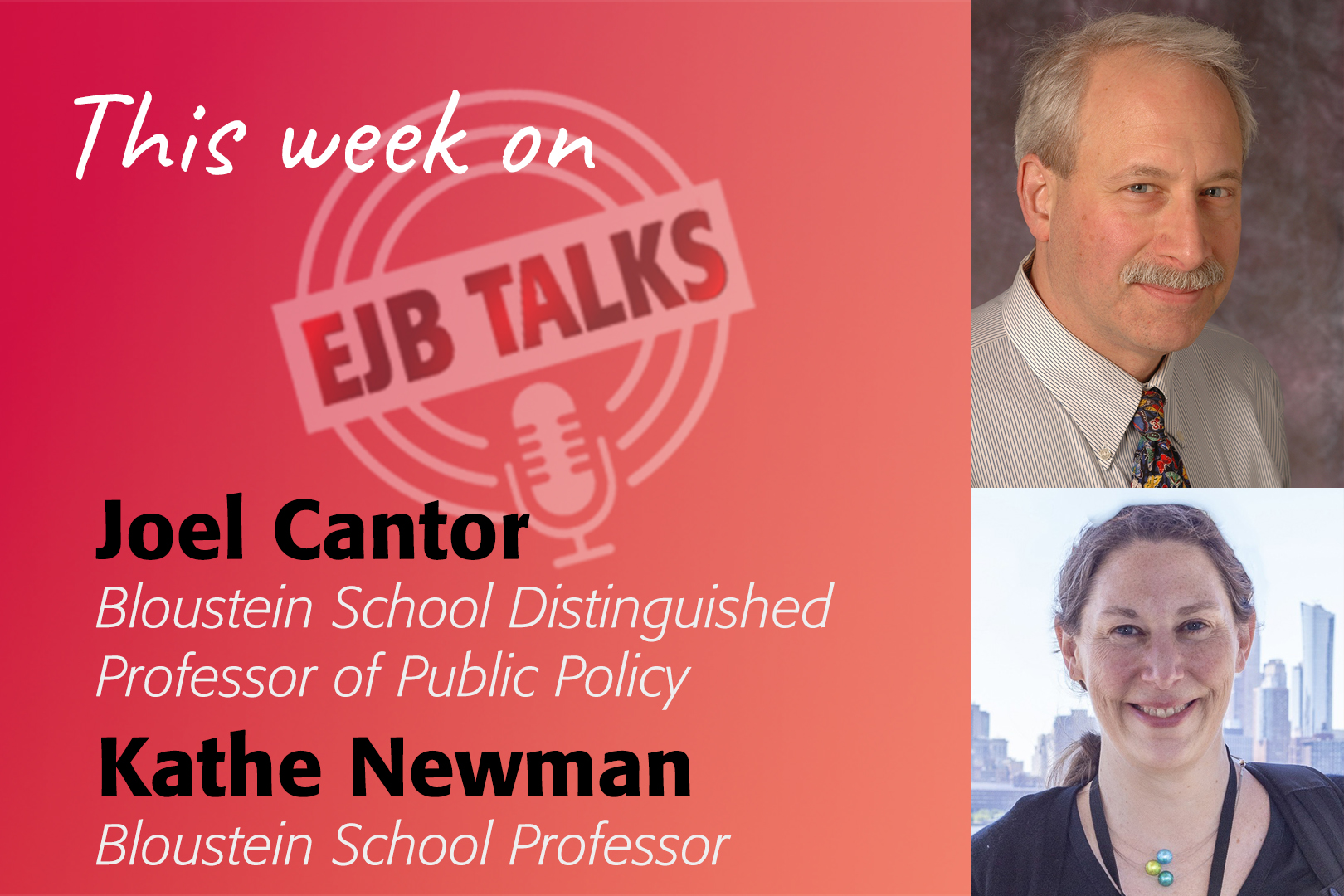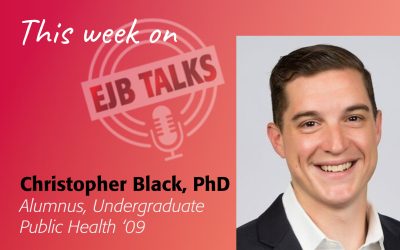Our EJB Talks podcast this week features Joel Cantor, Distinguished Professor of Public Policy and Director of the Rutgers Center for State Health Policy and Kathe Newman, Professor and Director of the Ralph W. Voorhees Center for Civic Engagement. They are part of a new Rutgers initiative, the Housing and Health Equity Cluster, which aims to address health equity issues through interdisciplinary collaboration across university departments. Professor Newman discusses how, through her urban planning work, she became interested in the connection between lack of affordable housing and poor health. Professor Cantor’s research into the health conditions of vulnerable populations utilizing Medicaid was often linked to long-term chronic homelessness. They explain how housing and health issues are deeply intertwined, with one constantly impacting the other in a cycle that is difficult to break. The work of the HHE cluster seeks to better understand these relationships and challenges through data analysis informing policy solutions for a better future for permanent supportive housing.
Transcript:
Stuart Shapiro
Welcome to EJB Talks. I’m Stuart Shapiro, the Dean of the Bloustein School. And the purpose of this podcast is to highlight the work my colleagues and our alumni in the fields of policy, planning, and health are doing.
For our fourth episode of this tenth season of EJB Talks, we’re talking to two of my longtime colleagues who have been tremendous contributors to the Bloustein School, but yet somehow have avoided coming on the podcast before! A very big welcome to Professor Joel Cantor from our public policy program, and Professor Kathy Newman from our world-ranked urban planning program. Welcome to the podcast.
Kathe Newman
Thank you.
Joel Cantor
Thanks Stuart!
Stuart Shapiro
So the reason we are having you both on together today–in addition to you both being wonderful people–is because of your recent work in the housing and health equity cluster. Can you explain what this cluster is and the ideas behind it?
Joel Cantor
Sure, I’ll start and Kathe can chime in. So, the University President’s office offers opportunities for faculty from across units to put together ideas to hire faculty, to address equity issues, to improve the diversity of our faculty, and to really build our capacity to address not just health equity issues, but equity issues writ large. And a couple of years ago, we got together with colleagues from Social Work and SEBS and put an idea together and it was ultimately approved. And we have moved forward achieving a lot of great things under the auspices of the Housing and Health Equity cluster.
Stuart Shapiro
So, let me get… let me have each of you sort of talk about how you came to this issue. And since Joel just talked, I’ll start with Kathe. As a housing researcher, how did you become interested in health and health equity issues?
Kathe Newman
So really, I’m an urbanist. And so I’m thinking about the kinds of challenges that people are facing every day. And health is really closely woven to housing in a variety of ways. People can struggle to find and retain housing if they have poor physical or mental health. And, and kind of in a very similar way, the kinds of housing situations you find yourself in, whether or not you can get housing in a place that really makes sense for you, might affect whether or not you have access to great medical care. Might put you in the line of some environmental hazards. There’s all kinds of really complex relationships between these two things.
Stuart Shapiro
And then from the other direction, Joel, as a health researcher. What brought you to housing and homelessness?
Joel Cantor
So, there has been, for some time now, a growing recognition in the health and healthcare research space, that social drivers of health are a bigger determinant of our health than the medical side, on average. And so there’s been growing interest in connecting, in addressing, social issues that are drivers of health. And you know, health and housing is sort of foremost among those issues. And the causality kind of goes both ways.
So Kathe comes into it because health is determinate of housing in a sense. I come into it because of the reverse. But these things have to be addressed simultaneously. So it’s a perfect opportunity for the kind of bridging work that we’re doing.
Stuart Shapiro
And a very complicated one, given that sort of bi-directional relationship.
Kathe Newman
So even though Joel studies some housing and I study some health, the types of things that we do and the way we do it, it could even be the way we talk about different types of social programs or methodology, all of these are a little bit different. And so the cluster gives us this amazing opportunity to sit with each other and to get used to saying, you know, really hard things like, I don’t know, I don’t know what that means? Can you talk to me about that more? And then, to be able to translate it into things that we do know so that we can more effectively work together towards the future. So that’s been really, really fun.
Stuart Shapiro
Yeah, it sounds like in the one presentation, I saw it was clear you were all sort of enjoying diving into these issues.
So Joel, it’s intuitive, at least at some level, that homelessness would lead to poor health. And I know you’ve done some work on that. Can you talk about the research questions you’re looking at in that relationship?
Joel Cantor
Sure. First, this work started really with the Affordable Care Act. When with a stroke of a pen in most states Medicaid expanded to cover populations that were previously excluded, including adults without dependents. And a lot of folks who experience homelessness are adults without dependents. So suddenly, Medicaid had this big liability for the care of people experiencing homelessness. And not only is homelessness bad for your health, but poor health leads to homelessness. And so, how to break that cycle became an important topic.
And so my group really dove in. And working closely with the New Jersey Medicaid program, which asked us to do some work in the space, to really examine how Medicaid services could be improved for people experiencing homelessness, especially those with long-term chronic homelessness. And, that population tends to have a very heavy burden of serious mental illness, substance use disorders, chronic physical conditions. A very high-need population, and the way they have historically used health services is through 911, and the emergency department. Which is suboptimal in every possible way. So our work is really all about figuring out how to connect people to better health care, to improve their health and enable them to improve their housing situation.
Stuart Shapiro
So you talked about the cycle there. Where are the possible intervention points on that cycle to try and break it?
Joel Cantor
Yeah, so we think that there are tremendous opportunities at the intersection of the homeless and housing services world, and the healthcare delivery system and financing worlds. They are historically very separate, you know. In my health policy courses I used to say, you know, Medicaid’s one of the most complicated federal-state programs that exists. And then I learned about housing services. And I no longer say that. And Kathe has educated me. ((laughing)) But these are two enormously complex areas, and getting them to connect at the street level, sometimes literally, and at the policy level, it just takes a lot of work. And the data flows, and even the jargon and how the money flows. All of that needs to be aligned so that this, among the most vulnerable populations in our society, can receive services in a way that’s effective for them.
Stuart Shapiro
So Kathe also runs our Voorhees Center for Civic Engagement here at Bloustein. And one of the projects that that you’re working on there is the New Jersey State of Affordable Rental Housing Project. Can you connect that work to the work you’re doing for the Health Equity Cluster?
Kathe Newman
Sure, absolutely. So where Joel is talking about kind of understanding that landscape of health services and the challenges, we’re doing something very similar on the housing side. Affordable housing is supported by a variety of federal programs and different agencies, and administered through very different kinds of processes. That means, and this is the not exciting world of this — that the data, right? Lives in very different places. And very practically, that means that if you want to look out into your community and see where all the assisted housing is, all by the federal government, it’s really hard to find it all in one place.
And so we’ve been taking all those data sets. With my colleagues, Eric Seymour, and Will Payne, and integrating all these things so that we can look out into the communities to see what the stock of assisted housing looks like. And also to understand many of these programs are time-delimited. So at some point, their contract to be affordable will end. And will either need some effort to preserve it, or to to extend it, or to renovate it. So buildings constantly need to be improved, which needs additional forms of assistance. So we’ve been trying to see, what does the stock of assisted housing look like in New Jersey? What are all the different programs-federal, state and local? And how do all these fit together so that we can really see affordable housing in one picture?
Stuart Shapiro
And now connect that to health for me.
Kathe Newman
So it’s positively critical of related to people’s health. So where your affordable housing is located, the quality of that housing, your ability to get in it and stay in it, are positively connected to health. If I’m not located near doctors offices, and services, and I don’t have access to transportation where I’m living, I’m not able to go, you know, access those kinds of services on a daily basis. As your housing gets more expensive, you may feel stress. Not knowing what your rent’s going to turn out to be. Worrying that your work hours are maybe being reduced through the pandemic. This was a, you know, really a sort of problem that we all became very familiar with. And people make some really hard choices when their housing costs are high. Are you going to remain sheltered? Are you going to keep your family sheltered? Or are you going to pay for your healthcare costs? Accessing a service, or picking up a medication? And so there’s just no way around the fact that they’re, you know, they’re all part of everyday life, and therefore, they’re very much intertwined.
Stuart Shapiro
Yeah, and if we look at housing and health, both as sort of fundamental needs to sort of get your feet under you. You know, making a choice between them seems obscene. I mean, it seems almost impossible.
Joel Cantor
You really can’t have one without the other.
Stuart Shapiro
Right. Right. And one other thing you said, Kathe, that I wanted to pick up on there. And it struck me and I’m sure this is something you’re looking at, but the time-delimitedness of affordable housing. Health conditions don’t have time limits. Right? You’re either permanent or you’re sick for however long you’re going to be sick. And to what degree has anyone looked at sort of, those time limits as a health problem?
Kathe Newman
I don’t know the answer to that. It’s a great question. I mean, I think there a lot of concerns, and I’m thinking… So you can have a lot of different kinds of housing needs, depending where you are in your life cycle, or in your housing cycle. So maybe you’re unhoused, and you need emergency housing, or temporary housing, or a form of assistance. And kind of, not only thinking about those federally-assisted time-delimited programs. There are lots of emergency services that people might get access to for a year or two years. And that might not be long enough to address a health concern, or other kinds of needs that you have. So I think the length of services, whether for the length of your housing, paired with a supportive service is positively critical to whether or not you’re able to not only access permanent housing, but stay there.
Stuart Shapiro
Alright, so give me some hope here. What, you know, through the work here, and I know you guys are still early, what are the things, the insights, that we’re getting that maybe help people in navigating this complex connection between housing and health?
Joel Cantor
Sure, I’ll give you an example of a project that we’re actually just launching. But it just gives me a lot of space for optimism. So the main intervention that is used to help folks who have chronic homelessness, who typically are also suffering, you know, mental illness and other things that sort of prevent them from fully engaging in work and all those things that help us get housing. Is permanent supportive housing. So it is, you know, if you have had enough homelessness, you become eligible for it. And you get intensive case management and rental subsidies. The word permanent means that it can be very long-term. But there’s also a tremendous shortage of supportive housing slots. So there’s interest and one or the other leaders of the cluster, [Emmy] Tiderington from Social Work is leading this work with us. Where we’re sort of looking at, what predicts success in leaving permanent supportive housing?
And Kathy and Eric are working on helping us figure out how the, sort of, local area of affordable housing conditions might be one of those factors. It’s a little bit of a data quagmire, but we’re digging in ((laughing)). And it’s funded by the National Alliance to End Homelessness, and they really are working, we’re working with them to develop some tools to help identify folks who can ‘move on,’ the term they use from permanent supportive housing into more mainstream, perhaps subsidized perhaps not, housing services to free up more slots for the people who are living on the street or cycling in and out of shelters. And, you know, it’s those kinds of things that happen at the intersections of this world that we really need to address. And that’s one that I’m particularly optimistic will be making a difference going forward.
Stuart Shapiro
Great. All right, let’s end. You’ve talked about one thing that you’re working on. Is there one other, sort of, project or future thing that either of you or both of you want to want to highlight?
Kathe Newman
So maybe I kind of can highlight a general sort of idea. So having this cluster and each of the projects that we work on together enables us to dig in more deeply and to understand these complex relationships better. To get closer to what the real problems are, and therefore the best policy solutions. So I’m very hopeful that each of these efforts, even when they’re hard, and difficult, and you don’t get the, you know… just the problems are tough. That we understand them better, to hope to a better future.
Stuart Shapiro
Great! That is a fantastic note to end on! And not to get lost in the day-to-day, both real-world challenges, and challenges of analyzing data. And to keep that big picture of where you’re going in mind. Thank you both so much for for coming on the podcast.
Kathe Newman
Thanks for having us, Stuart.
Joel Cantor
My pleasure!
Stuart Shapiro
And also a big thank you to Tamara Swedberg and Karyn Olsen for working on the podcast. We will see you next week with another talk from another expert from the Bloustein School. Until then, stay safe.




